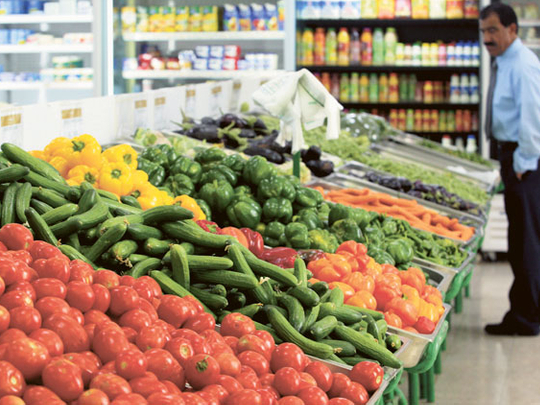
Abu Dhabi: Although rents have fallen in Abu Dhabi over the last year, the rise in food prices and education costs have increased cost of living for residents, who say they are feeling the pinch.
The Statistics Centre Abu Dhabi (Scad) recorded a 1.7 per cent rate of average annual inflation as of January this year. Compared to January last year, this inflation rate represents an increase of 0.8 per cent in average consumer prices.
Any rise in the prices of essential commodities like food naturally causes people with lower income levels to have to spend a greater portion of their earnings, explained Giyas Gokkent, group chief economist at the National Bank of Abu Dhabi.
According to the Scad report, households with the lowest one-third income levels in the emirate of Abu Dhabi faced a price rise of 1.1 per cent between January 2011 and January 2012, compared to just a 0.6 per cent rise for households with the highest one-third of income levels.
"Food prices, which have a significant impact on household spending, increased by 6 per cent between March 2011 and January 2012. The cost of education also rose by 5 per cent in the same period," Gokkent said.
Food prices and education costs have in fact seen an upward trend since April 2009, rising 19 per cent and 31 per cent respectively since April 2009, the economist added.
Consumption habits
Nevertheless, consumption habits have also resulted in a greater proportion of household income being spent on the purchase of food items on average.
According to Dr Hashim Al Nuaimi, director of consumer protection at the Ministry of Economy, 23 per cent of a family's income in the UAE is spent on purchasing food this year, compared to 16.6 per cent in 2010.
"People today spend money without a budget. We try to raise awareness that the spending should be in its place… Each family should have a budget and stick to a list of groceries," Dr Al Nuaimi said.
"We expect to see modest price increases for these items over the rest of the year, consumers will automatically adjust by substituting [cheaper products for more expensive ones] as a general principle," Gokkent added.
Meanwhile, rents, which have the largest weight when the capital's consumer price index is drawn up, fell by 0.8 per cent in the period from March 2011 to January 2012.
Matthew Green, head of research at the leading commercial real estate consultancy, CBRE Middle East, said studio and one-bedroom apartments saw the largest declines in rent, falling by 19 and 22 per cent respectively, while rents for three-bedroom apartments fell by just 8 per cent.
Echoing Gokkent's assessment, Green added that rents are likely to remain under pressure due to "significant new supply set to enter the market this year".
"We would anticipate a rent decline of 10 per cent across the board, with locations off Abu Dhabi island facing the greatest downward pressure. In fact, rents for off-island locations will become more disparate to on-island rents," Green said.
Gokkent, therefore, recommended that residents consider entering into short-term tenancy contracts to be able to take better advantage of falling rents in the city.












